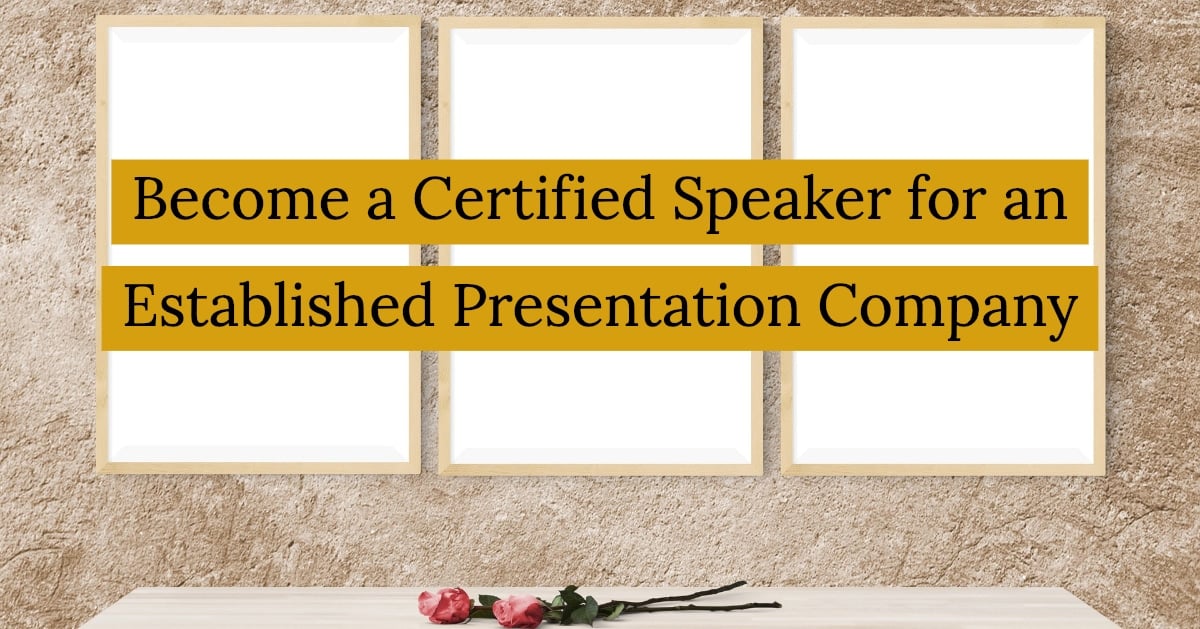
We are continuing our series on How to Start a Public Speaking Career, and in this session, we will show a shortcut by working for an organization that is already established. While our first post mentioned a wide variety of approaches, one of the advantages of working with an established company is that the company the speaker is representing has already done the hard work. They have already created the content, vetted the content, and created a customer base. The downside is that the speaker can’t create or promote his/her own content as easily. In addition, if the speaker quits working for the company, he/she will likely have to start from scratch to create their own content and customer base.
In this episode, I’ll cover the pros and cons in more detail. I will also give a step-by-step process that you can go through if you want to become a speaker for one of these companies.
The Advantages of Becoming a Certified Instructor for an Established Company
This is the way that my company, The Leader’s Institute ® attracts some of the highest quality speakers in the industry. I remember the first time that I had a high-level instructor candidate call me. It was in 2003. At the time, I was still struggling to establish The Leader’s Institute ® as a brand. However, at the time, I already had a solid place teaching classes in Dallas, Houston, New York, Chicago, and Los Angeles. Since it was just me, I was very busy (and very exhausted).

So, when he called me, he wasn’t looking for a career. He was looking for a way to create a side hustle so that he wouldn’t have to tap into his “nest egg” for a decade or so until he officially retired.
He was my first instructor (outside of myself).
Interestingly, though, the company grew so much during the next couple of years, that at one time, he was pulling in over a quarter-of-a-million dollars every year teaching for my company part-time.
It was a win-win-win for everyone involved. My company was able to help more people. Clients were able to learn from this man’s experience. In addition, he was able to add to his “nest egg”.
A Lot of Established Speaking or Training Companies, Hire Speakers on a Contract Basis Based on Their Expertise.
Although it is tougher to come by these positions, if you do find one, it is a fantastic shortcut into a professional speaking career. Many professional organizations require a certification process. (We do.) This means that the company will train the new speaker to be able to deliver their content. Some of these processes are very simple. (I’d encourage you to avoid these companies.) However, some are very thorough. (These companies are more interested in establishing a solid brand, so they are more valuable.)
The Disadvantages of Becoming a Certified Instructor for an Established Company
Some of these established training companies require that you purchase their certifications or purchase a license. Yes, this means you might need some added or ongoing education. Obtaining certification is not necessarily a disadvantage, but it can become one.

Over the next few years, the market was flooded with amateur speakers spreading the word about Covey. Luckily, he sold his company to the Franklin Planner folks before it cratered.
However, Franklin-Covey wasn’t so lucky. Their public stock dropped to under $1 per share within a few years. The certifications were pretty worthless. So, the people who went through the train-the-trainer sessions just lost their money and time. They didn’t receive a lot of value from it.
A similar thing happened to the first Anthony Robbins franchise owners. Within a few years, a bunch of them sued him for their franchise fees and punitive damages.
Look for a Company’s Fruit (Successes)
My advice is to look for the fruit on the tree. The speaking industry may be full of certification opportunities, but not all of them will have much value. If you are being asked to invest in your certification, go find a trainer who has paid for that certification and is making a good living with it. If you can’t find one, you might want to stay away. An easy way to help make your decision is to base it on others’ successes as a test of longevity. An association’s certification process should hold a history of success and a proven track record of experience from their certificate holders. Even the most committed professional doesn’t want to wait around forever to gain success or notoriety. An audience member’s attention is more quickly earned when it’s attached to a well-known name or company.
You Are Hitching Your Wagon to Another Company.
The major disadvantage of hitching your wagon to another company, though, is that in many cases, you are captive to that company. You will likely be required to sign a non-compete and/or a non-disclosure agreement with them.

For instance, when I left the Dale Carnegie organization to start my own leadership company, I had to totally create my own content from scratch. I also had no clients at all. I couldn’t use the network of contacts that I had spent years developing, because it was a conflict of interest. Business owners take pride in the success they’ve built and deservedly so, try to protect that. (I’ve had bosses who almost take offense or a personal attack when successful people within the company said they were leaving.)
Although I left the company on good terms, my ex-boss came across my new company a year or so later. He went ballistic and threatened to sue me. He assumed that I was using content from his company and assumed that I was trying to take customers from him.
The only thing that saved me was that… Well… I wasn’t. I was finding my own potential clients, creating my own online presence, and creating my own original content.
I still had to hire an attorney and send over my new manual to him for approval. It cost me a fortune, and at the time, I was broke.
So, before you partner with an established company, check them out thoroughly. You also need to come to terms with the realization that it will be incredibly difficult to break away and start your own company later.
Here is a Step-By-Step Way to Start a Speaking Career Working for an Established Company
I’ve hired and trained over 100 professional speakers. None of them replied to a job posting that I made. (I’ve never had to post a job opening for a public speaker.) So, don’t waste your time looking for postings on job boards for these companies. (You will likely never see one.) However, these companies are always looking for new talent. So, don’t be discouraged if you can’t find a “Work for Us” link on their websites.
Many new speakers find their “in” by following these simple steps. They will help you if you want to work for one of these companies.
-
- Start with Google/LinkedIn. These positions are not common. If you happen to find solicitation for one, you likely wouldn’t want that position. You can start your research by using either Google or LinkedIn. For instance, if you type “Public Speaking Training Company Dallas, TX,” you will get a bunch of job posting companies first. (Skip through these. They will be a waste of time.) However, the first Google result after these job posting sites is for… wait for it… Fearless Presentations ®. Let’s say I want to teach Internet Marketing. I did a similar search, and the third result was a company here in Dallas that has three upcoming seminars posted. If they have three seminars, it is likely that someone is teaching them. He/she may need some help. Just replace terms with the type of training that you want to specialize in, and you should be able to find a couple of options.

-
- Do Your Research. Although this seems like an obvious piece of advice. You will, most likely, only get one shot to get your foot in the door and set an impression. Make it count. Look up the name of the company in the news, on LinkedIn, and look at their social media accounts. See if you can find any information about their leadership and decision-makers. (LinkedIn is great for this.) In addition, type this phrase into Google. “Become an instructor for ‘[company name]'”. Most likely, it won’t be that easy to find a way in, but on occasion, you can get an idea.
- Look on LinkedIn for a Current (or Past) Instructor. Go to LinkedIn and type “Instructor for ‘[Company]'”. Look for someone who used to work for the company and ask the person to help. People who no longer work for a company are way more honest with their feedback. *** In most cases, if you get one of these people to respond to you, their guidance will be an effective way to find who to talk to and how to get your foot in the door. The right people will give you some quick tips for a great way to find your way in.
- Once You Know HOW to Get in, Work on Your Why. Before you contact the company, come up with a few reasons why the company would want you to be a speaker for them. If you don’t have an answer, don’t bother contacting them. Don’t over-think this. For instance, in my industry, an instructor in a new city allows us to expand our reach in that city. In addition, if you have expertise in a certain industry that we have not dug into yet, you as an instructor for us would allow us to reach new audience members. I had a woman contact me a couple of years ago who was a trainer for a major law firm. Although we have taught a bunch of presentation skills classes, we get very few attorneys through our classes. Since she specialized in that industry, she allowed us to reach an entirely new group of people. Bottom line is that your knowledge and expertise in a specific topic can help companies find a new target audience. (See Presentation Secrets for Attorneys Podcast.)
- Try to Contact the Decision Maker Directly. If you call my company’s 800 number and ask for a job, you will end up in a dead-end voicemail. However, if you were to reach out to me directly, I always respond personally. There’s always a high demand for determined people. Most executives will reach out personally if they need talented people like you. In today’s world, this is incredibly easy. I prefer if you just call my 800 number and ask for me personally. (A lot of people overlook this simple option.) However, I have a twitter handle and a LinkedIn account which is checked on a regular basis. Most often, if someone sends a DM to me through either of these routes, I respond. Other people who hire speakers are just as likely to respond as well. The point is, that we don’t have to go out and advertise for professional speakers. They come to us. If you don’t, you’ll never be considered. The good news is there’s no harm in trying. I mean, what’s the worst thing that could happen?

- Send a Bio and Video. Never, never, never send a resume if you are applying for a speaking job. Professional speakers will never send a resume or CV. They will send a Biography. The Biography should be one page (or less) and include a headshot and at least one in-action photo of you speaking to a group. In addition, send a short video of you speaking to a group. If you don’t have a video, see the post Become a Professional Speaker by Speaking within Your Industry. I gave a few tips on how to create one of these. You might also think about sending in one of your podcasts or youtube videos. Give the company an idea of what you offer.
- Send a Thank You. Once you have been interviewed, send a personal Thank You note or card. I got my first job as a professional speaker over a year after I met the woman who hired me. She and I met for a casual chat over coffee, and I sent a Thank You card immediately after we met. I wasn’t looking for a job. In fact, I was interviewing her to find out more about what she did. A year later, when I contacted her again, I asked if I could work for her. She didn’t say “yes” right away, but within six months of that second contact, she hired me. After I had worked for her for a while, she reminded me of that Thank You card. (I had forgotten all about it.) She had kept it, and she told me that she hired me because of that. She had never had anyone else who had asked her for a job ever do that. Even though this approach may seem old school, it’s one of the best ways to get recognized.
- Follow Up. These people are BUSY. No matter how great the interview went, the person will likely be distracted afterward and just forget about you. A week later, make a follow-up phone call asking if you are still being considered. Ask what you can do to move forward. A week later, do the same thing. Be persistent. Your persistence will have a higher rate of response than people who use the interview and done approach.
If you really want to be hired by one of these companies, these steps will help a lot. In fact, I’d wager that they are practically fool-proof. Get out of your comfort zone and don’t skip any of the steps. Do your research, come up with a way that hiring you will help them, make personal contact, and follow up. They’ll love you!

